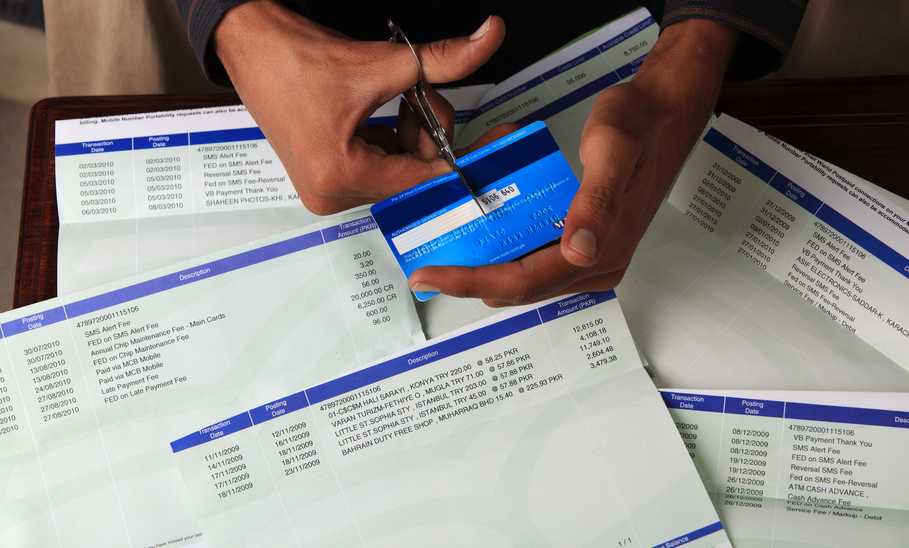Defaulting on Credit Cards: Why It Happens and What to Do

Our evaluations and opinions are not influenced by our advertising relationships, but we may earn a commission from our partners’ links. This content is created by TIME Stamped, under TIME’s direction and produced in accordance with TIME’s editorial guidelines and overseen by TIME’s editorial staff. Learn more about it.
Credit cards are not for everyone. The ability to spend beyond your means—to the tune of tens of thousands of dollars, in many cases—is a responsibility that lots of people can’t handle. If you find yourself seriously unable to pay your bills, you might end up defaulting on credit cards.
Defaulting on your credit card means you’ve failed to make at least the minimum payment for 180 days. Should that happen, your credit score will plummet, and your account might be closed and handed to debt collectors. Your wages may also be garnished if a lawsuit is filed.
Credit card default is serious business. Here’s everything you need to know.
When you miss a credit card payment, you’ve got a limited time (usually between a month or two) to make your minimum payment before your account becomes “delinquent.” If you fail to make that payment, you could be hit with steep fees and your card may even stop working.
Fast forward to 180 days later. If you still haven’t made your credit card’s minimum payment by then, you’ll have been contacted by your card issuer (likely several times) about your missed payments. The issuer will want to know how you plan to make it whole. At this point, the issuing bank has the right to close your account, write off your balance, and hand over your debt to a collection agency, which will then hound you relentlessly.
Credit card default isn’t a surprise attack. You’ll know well before it happens, and you’ll have been expecting it.
In the lead-up to your default, you’ll have missed a lot of payments. Payment history accounts for 35% of your overall credit score—meaning your score will have tumbled quite a distance, especially if you previously had excellent credit. Making on-time payments is the single most important thing you can do to maintain healthy credit.
Credit utilization accounts for 30% of your overall credit score. The rule is to keep your credit utilization below 30% to maintain a healthy score.
If your credit card is closed due to default, your credit utilization will increase to 100% on that particular account. Additionally, you may find that your other credit cards will have their limits lowered. Issuers are free to increase or decrease your credit line whenever they want—and they might yank back some of your available credit if they sense you’re in financial turmoil. This can have a devastating effect on your credit utilization.
Your credit card issuer will report to the credit bureaus that you’ve defaulted, which is a glaring stain on your credit that takes seven long years to disappear.
A default on your credit is likely to result in things like higher rates in the future (banks demand higher compensation to lend to borrowers with a patchy track record of paying debts). It can also present other stumbling blocks in life, such as difficulty renting an apartment or even getting a job. Many companies pull a potential employee’s credit as part of the interview process. Depending on the field in which you work, a default on your credit could be the difference between you and another candidate.
Some credit issuers may not give you a second chance. If you’ve defaulted with a bank in the past, that bank may never be willing to lend you money again—even if the default has fallen off your credit and you’ve now got a stellar credit score.
Defaulting on a credit card is potentially burning a bridge with a lender forever.
The obvious choice is to pay the debt collectors what you owe. This probably isn’t an option if you’ve defaulted on your credit card. If you couldn’t manage to swing the minimum payments, you likely don’t have the money to pay.
Debt collectors are out for your money. If they’re entirely convinced that you simply don’t have it—and won’t have it for the foreseeable future—they may be willing to settle with you so they’ll at least get something.
If you can agree on a figure, make sure you get the debt collector to declare the arrangement in writing before you send the payment.
If you can’t pay (or settle) your debt, reaching out to an attorney to begin the process of bankruptcy could be your best option. Declaring bankruptcy should be a last resort. However, sometimes you are left with no alternative. It’ll end the incessant calls from debt collectors, and it can zero out a lot of the unsecured debt that you’ve accrued. You may still be court-ordered to pay some of your debt, but life will become more manageable.
Bankruptcy will fall off your credit report within seven to 10 years.
Defaulting on a credit card is one of the worst things you can do for your credit. Missed payments coupled with potential account closures and blacklists from issuers can sabotage your future ability to get a mortgage or auto loan, rent an apartment, or even secure your dream job.
If you’re in the throes of credit card default, make it your absolute priority to bring your accounts current.
If you’ve defaulted on your credit cards, you’ll have to wait up to seven years for it to fall off your credit. Even if you pay your debt, the default will stay on your credit report.
Rebuilding your credit after a default is similar to building your credit for the first time. Seek out credit opportunities that tolerate poor credit and use them often and responsibly. Among the brands that offer cards to people with bad credit are secured cards, such as the OpenSky® Secured Visa® Credit Card, which are secured by cash that you deposit when you open the card. There are also unsecured credit cards for people with bad credit—among them the Mission Lane Visa® Credit Card and the card_name. These likely come with more stringent terms and fewer rewards than cards you were offered before the default.
Once you get a new card, pay your bills on time and keep your credit utilization low. It can take years, but you’ll eventually restore your reputation and regain access to better financing offers.
The only way to clear a credit default yourself is by disputing the item on your credit report with the three main credit bureaus. For this to be successful, the default must be a mistake. Actual defaults cannot be removed for up to seven years, which is when they will naturally fall off your credit report.
The information presented here is created by TIME Stamped and overseen by TIME editorial staff. To learn more, see our About Us page.



